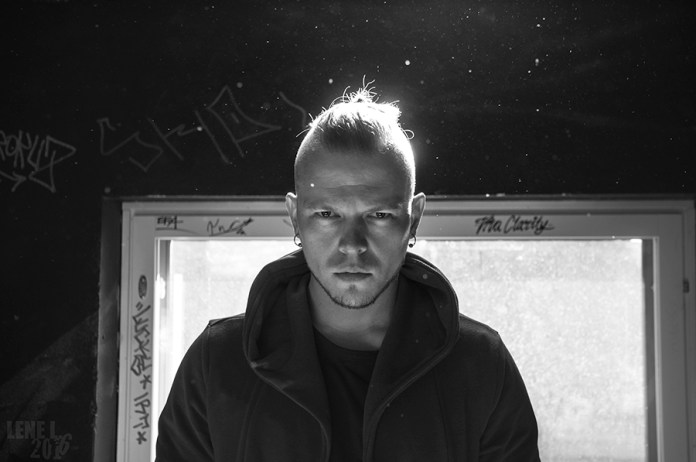The early 2000s introduced a plethora of excellent metal acts to the whole of Finland, including Suolahti-based MACHINE MEN, who served their IRON MAIDEN -esque heavy metal with Gothic appearances and a rocking attitude for over a decade. A few years after they called it quits, two of the MACHINE MEN returned to the scene of the crime together – guitarist J-V Hintikka, who had kept himself busy with a number of bands, and singer Antony Parviainen, who’s toured with the RASKASTA JOULUA ensemble for quite a few winters. Along with musicians from bands such as SWALLOW THE SUN, TRAUMA FIELD, and BEYOND THE DREAM, these Finnish metal veterans brought a new musical endeavor, PSYCHEWORK, into daylight in November 2015. Bold, symphonic, dark, and ambitious from the first snippets of songs, we predicted that this was a band that would sweep the melodic metal audience off their feet, and the first show of the year only confirmed those hunches.
Now, over half a year since their first gig, at the peak of releasing their debut album, “The Dragon’s Year,” PSYCHEWORK is still a well-kept secret for the most part, so naturally we wanted to know more. Lene L. met frontman Antony Parviainen on August 3rd, 2016, to talk about what’s waiting for us between the album covers, how the band was formed, and what the years have changed in being a musician – or have they?

It’s a bright and sunny early August day in Jyväskylä, when we meet with singer Antony Parviainen at Lutakko club, so we decide to sit outside the venue for the interview while the rest of the band is rehearsing inside their practice space. Politely, he apologizes for being a couple minutes late, and answers my questions thoughtfully.
So, you guys have had a couple gigs now, a couple coming up, and an album coming out in the beginning of September. What feelings come immediately to mind when you think about all of this?
Feelings that come to mind… well, of course regarding the album release, this has been in the works for quite some time now. The album’s been ready for a pretty long time and the songs have been ready for quite a while, so it’s maybe not a new album for us, per se. We have most of the songs for the second album done already – or well, whether or not they’ll be on the second album, I don’t know about that, but quantity-wise there’s that much done. But we’re anticipating it – it’s going to be great to see people’s reactions, what are they expecting, are they expecting anything, what kinds of stuff they’re expecting, and… well, those two songs we’ve released don’t entirely express what the whole album’s going to be like in the end.
As you mentioned, this has been a long time in the making – how have you managed to keep everything a secret, so as not to let any extra snippets of songs or other information leak onto the internet, like videos from gigs and so?
Well we’ve had only two gigs so far, the first here at Lutakko in January and one festival gig last month. There’s been surprisingly few of those around the web, really. And if someone has filmed something, they’ve come to ask me if it’s okay to put that up, and I’ve said that it’s not, that you can upload this and this song if you want to. But it’s great that people have been asking permission first.
I was there at your first show as well, and the reception from the audience there already was quite stunning, taking into account that you only had one song out at that time. Has the enthusiasm from people surprised you at any point?
Well yeah… Lutakko did surprise me and probably the whole band, when you don’t expect anything and you have done this for so damn long – this album and the songs, been practicing really long, there were hell of a lot of line-up changes – there were probably eight different bassists! And then we had to have a stand-in drummer for the first gig and that resulted in a hassle, like, “Oh hell no, now we have to start practicing these songs with a new drummer.” Those songs had been played for a light-year at the rehearsal space and from our own opinion they went quite okay, but then you had to start from zero again with a new guy. There have been some phases like this; the group’s been changing like socks, but it’s all right, the burn for doing things with the band is strong, so you do everything you can for it. And… right, to answer the question, yes, it did surprise me. I didn’t really expect anything special from it. My expectation was just that we could do it soundly from start to finish, and from my opinion – at least from band’s part – that expectation was fulfilled really well. But yeah, it was a nice surprise.
As you said, you’ve had quite a few line-up changes now already; how did you find all the pieces to this current puzzle?
Well, hmmm… like I mentioned earlier, there have been a lot of different guys we’ve had trying out for different instruments, and when it doesn’t quite work out, you have to look for a new one. And then when you come across a suitable one, they’ll stay in the band, showing with their actions that they’re worth keeping in the spot. So there, little by little, this current combination was found.
Some of you guys have other bands and projects besides PSYCHEWORK – for instance, drummer Juuso Raatikainen plays in SWALLOW THE SUN as well – so how do you divide time between them? Is PSYCHEWORK the first priority?
For the rest of us it is. Of course it can’t be for Juuso; we’ve had two gigs and SWALLOW THE SUN has had two thousand, so for his part, his priority is quite clear. But it’s worked so far and we’ll see how it’ll go in the future.

Building a sound for “The Dragon’s Year“
While we talk, Antony takes his time to answer, calm and reflective, with an additional friendly chuckle and smile now and then. It would be easy to think that he’s somewhat reserved, but at the same time he comes off frank and honest about how things were shaped, for both the first album and the band itself. He chooses his words carefully, but does not dodge shedding light on the very personal background for the lyrics on “The Dragon’s Year.“
You’re responsible for the lyrics, but who has the main responsibility when it comes to composing? Does everyone contribute to the song-writing process?
For this album, the starting point for most songs was me writing the lyrics, or a text with a general idea, and then I did vocal melodies and strummed a melody with an acoustic guitar. Then I gave J-V [Hintikka, guitars] the draft I had grunted on my iPhone, which sounded extremely bad, but he managed to get the idea from there really well, and of course I explained what the song was about, that it needs this kind of feeling and so on. So J-V and I are responsible for all of the songs on the first album. Most of them were made like this, first with the text from me, but I think there are one or two songs that were started by J-V, based on riffs.
What kinds of things do you draw lyrical inspiration from?
On this first album they mainly deal with a kind of… dark phase in my life, one that took place a bit over 3 years ago. I had leukemia and it stems from there, that hospitalized life and how I’m struggling to return to the living. Most of it tells about that. It kind of just went like that. It wasn’t a plan that, “now I’ll write all my stories about this and then we’ll do an album,” rather than that it was sort of… diary-like, trying to put that in to a lyrical form, whatever comes to mind.
What are the things that make a song a “PSYCHEWORK” song then? Is there anything like that yet?
Well, we’ve tried a bit to achieve a kind of theatricality there, that there’s a clear drama arc within the song, and some rumble, a good vocal melody, those kinds of things. Maybe… well, yeah, I guess it’s there. I can’t say it more precisely just yet. A little bit of theatricality and… color. Moods.
Are there some things – musically – you wouldn’t do, or directions you wouldn’t take?
I guess there’s a lot of directions [chuckles], but if we talk about heavy music style, rock style, leaving out all the rap and blues and that kind of stuff, and staying inside a more narrow area, I guess traditional ’80s style heavy rock is a thing we won’t go for. We probably wouldn’t start dishing out the sports news theme kind of synths and stuff like that.
You mentioned the lyrical subjects, but does the album have a common thread musically?
We did strive for getting the drama arc for the whole album like that as well, in a way that at first it is more straightforward, showing a little bit in the beginning – in the first song – what kind of moods and themes there are going to be on this album, and it grows darker towards the end. There’s some quiet waters, a serene chapter in between, with some beautiful piano and cello tunes, and from there it gets more grim bit-by-bit, going very dark at the end.
What album, artist, or genre have you most recently gotten really excited about?
Like, really, properly excited? I’m quite omnivorous with music in that sense that if there’s a good melody, a good vocal melody, basically anything goes, but gotten really excited… Probably KAMELOT and EVERGREY, their latest albums.

“There’s always the same spark in it.”
It’s been roughly 20 years since MACHINE MEN started out, so I was curious to hear how Antony views the changes that have happened since those days, both in making music and being a musician. In equal measures of passion, ambition, and fondness towards music, with a healthy dose of realism, he perks up while talking about what’s in it that makes him tick – it’s easy to see what an important part music plays in his life, something a lot of us can likely relate to.
If we delve into the past a little bit, MACHINE MEN has been buried for a few years now, and with them you had the chance to do your thing for over a decade at the time – how have things changed from the times you started out with MACHINE MEN, generally in the music scene or for yourself?
Well, now we have loads of debt [laughs], day jobs, and so on, so it has changed quite fundamentally. Back then we still lived in mom’s and dad’s place, practiced every day; there wasn’t really anything else but the band, everything went by the band’s terms, the whole life, back then… it’s changed, of course, but not making music, the burning for it hasn’t remotely changed. But well… when you’re a younger lad and perhaps have more vigor and such, being more blue-eyed and a little dumber, even, things are quite different. At least inside your own head.
What about things with record companies and such – has working with them changed over the years?
Yeah, of course. The times are different – records aren’t selling as well, the record companies are having a hard time, and there’s a limit to everything. More difficult, that’s what it is.
Are there things that have stayed the same from those times as well?
It’s that burn for making music, and when you’re up there on stage, that feeling of succeeding there, something like that you don’t… the good feeling that you get on stage, that’s still the same, there’s no feeling like that anywhere else. You can’t get that from any other place. There’s always the same spark in it.
My next question would’ve been about what drives you forward as a musician, but that was already quite a good answer to that as well. Is there anything more to add?
Well yeah, the burn to make music and perform it, writing songs and writing stories, that’s the definite point and purpose of it all of course. And well, gigs are a big part of it, but naturally, in touring there are an awful lot of bad things too, ones that I don’t like at all, and for that I have a bit of a love-hate relationship with music, but… that burn, that’s the thing, that and believing in yourself – that some day I will get something more.
Is there something that was left to achieve with MACHINE MEN that you’d like to do with PSYCHEWORK now, or are there things that you’d like to achieve as a musician in general?
Well for instance, creating more diverse songs, building those moods and drama arcs more, writing better stories, and those kinds of things. That’s what I’ve been trying to start to do with this new band. Of course there was a lot left to achieve, but we did do a lot of things, albums, and a lot of good gigs with MACHINE MEN as well, but musically it is perhaps more important that I do my own thing with this new band now.
What are you looking forward to with PSYCHEWORK most, from the rest of the year after the album’s release?
What I look forward to is naturally a continuum, that there’s going to be another album, that we get a good drive going on there as a band, more gigs under our belt, and more confidence in that. That continuum fascinates me quite a lot – that is, to me this is not just a project like, “Let’s make this one album because I had things to say and see later what we’ll do”; this is certainly the main thing and we’ll do it with full force from the heart and the soul, like we did with MACHINE MEN back in the day. This is only my second band in this lifetime, the second real band, and that’s why I haven’t bothered to set them up when there has been nothing more to give.
When you do something, you do it well, right?
Yeah, and one can do cover gigs in between, if there’s a hunger for gigs. But I like to set up these real bands only every 20 years, so maybe this is the last one then.

Interview by Lene L.
Musicalypse, 2016
OV: 5320
Links
Recent posts
[recent_post_carousel design=”design-1″]
Related posts
News post





